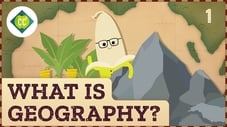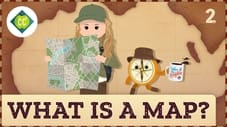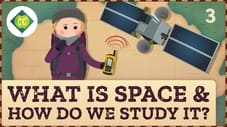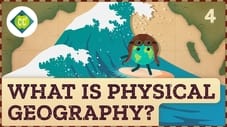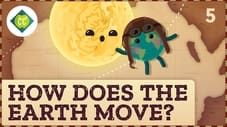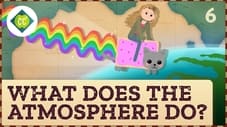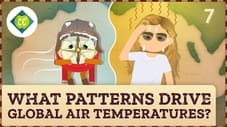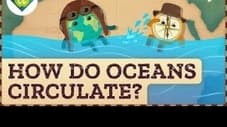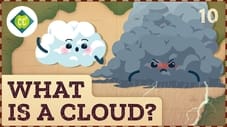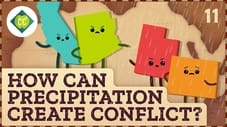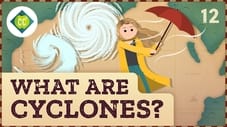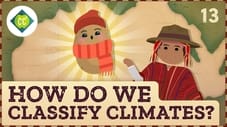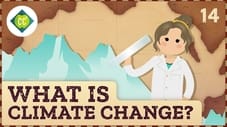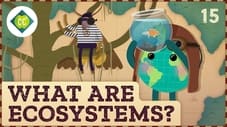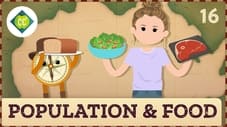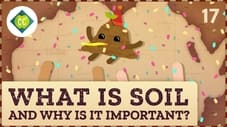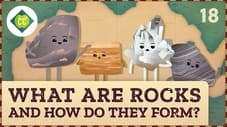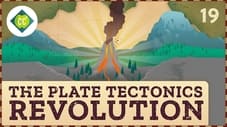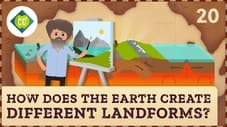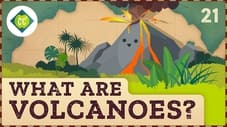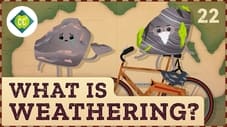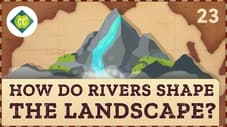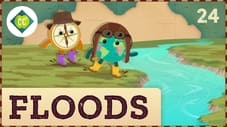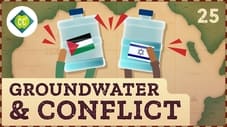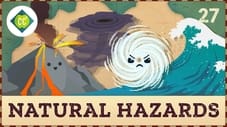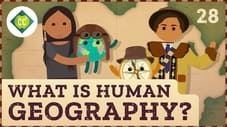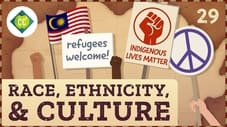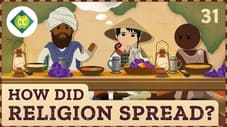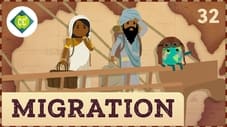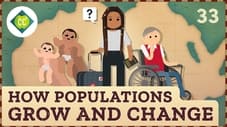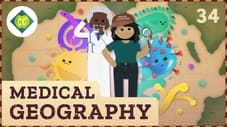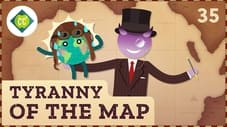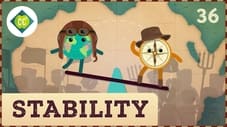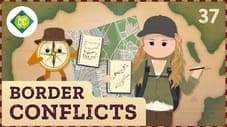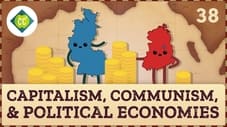John Green — Executive Producer
Episodes 50
What is Geography?
So, what is geography? In our first episode of Crash Course Geography, we will endeavor to answer this seemingly simple question with the help of a similarly simple factoid: that the US imports more than 3 billion pounds of bananas from Guatemala each year. But as it turns out, beneath the kinds of factoids we usually associate with Geography are much grander stories that really are Geography. So let's go a little bananas as we explore the sordid history of the Chiquita banana.
Read MoreWhat is a Map?
From navigating a cross-country road trip (or just finding the nearest coffee shop), to analyzing election results (or the latest meme on K-pop group popularity), maps play a huge role in how we interpret the world! Today, we're going to talk about the differences between reference maps and thematic maps, take a closer look at how projections play a part in how we perceive maps, and discuss the role of the cartographer (or map maker) in all of this. Maps are incredibly powerful tools and play a crucial role in how we understand the world, but they are also made by people, so it is our job to think critically about how these stories are being presented to us.
Read MoreWhat is space and how do we study it?
Today we're going to talk about SPAAAAAACE, but not like stars and satellites and stuff. Instead, we're going to talk about geographic space. In geography, we can look at the world and the places and spaces we inhabit with four distinct lenses: space as a container, topologically, socially, and how we perceive it. On this journey, we'll make stops in Antarctica, Haiti, and China as we introduce the tools you'll need from surveying and remote sensing to community-created maps to help us better understand and navigate our world.
Read MoreWhat is Physical Geography?
Traditionally, geography is studied as two interconnected parts: physical geography and human geography. For the first half of this series, we will be focusing on physical geography, which is all about recognizing the characteristics of the environment and the processes that create, modify, and destroy those environments. But remember, human-environment interactions are fundamental to studying geography so we won't be ignoring human impact, it just won't be the primary lens we're using to view the world. Today, we'll explore erosional gullies in Madagascar as we discuss the world's dynamic landscape, the Great Barrier Reef as we introduce the four major earth system (the atmosphere, hydrosphere, lithosphere, and biosphere), and we'll finish with a deep dive into Iceland as we introduce the major realms of physical geography.
Read MoreHow Does the Earth Move?
Today, we're going to talk about how the Earth moves, but to do that, we're going to have to go way back to the early days of the galaxy! Processes that happened before the Earth even formed have led us to the geographic patterns and processes that create Earth's environments and support all living things. We'll talk about how the Earth rotates, the effects of it being slightly tilted, how events like sea ice melting impact how the Earth wobbles, and of course talk about how our elliptical orbit gives us seasons. So many of our life decisions are influenced by the motion of Earth. It guides where we decide to live, what food we eat, or even what weather we experience - which we'll talk about more next time.
Read MoreWhat Does the Atmosphere Do?
Much like a cell membrane, our atmosphere forms a protective boundary between outer space and the biosphere that allows for all life to exist on Earth’s surface. Today, we’re going to talk about its composition and layers (the troposphere, stratosphere, mesosphere, and thermosphere), follow the path of a sunbeam of light as it travels through space and (potentially) reaches Earth’s surface, and discuss how the greenhouse effect can be both a good and bad thing!
Read MoreHow Does Air Temperature Shape a Place?
Today, we’re going to visit Siberia and take a closer look at how temperatures there (and around the globe) impact the way cultures, communities, and landscapes form. Air temperature plays a much bigger role than just helping us decide what we’re going to wear everyday, it dictates the kind of foods we can grow, how we build our cities and roads, and the kinds of industries that can even exist in a location. And in a region like Siberia, where it can get cold, like REALLY COLD, the air temperature has had an incredible impact on life. But before we end this episode we’ll warm up with a visit to Phoenix, Arizona to talk about how they too have to make a lot of decisions due to the extreme heat of a city in the middle of the desert.
Read MoreWhere Does Wind Come From?
There's an invisible force shaping our lives, affecting the weather, climate, land, economy, and just whether a flag looks majestic or not - we're talking about the wind! Today we’re going to go into the science of where the wind comes from and take a closer look at the major wind systems and pressure belts across the globe. We'll explain how the Coriolis effect causes the winds to curve (and makes air travel a bit more complicated), explore the doldrums and horse latitudes that could stall ships for days, and show the enormous impact the trade winds had on European colonization of the Americas.
Read MoreHow Do Oceans Circulate?
Today, we're going to take a closer look at how the oceans circulate by following the life of a discarded water bottle as it gets snagged in the North Pacific Garbage Patch. We'll talk about what causes the movement of water, called current, both near the surface and much deeper in the oceans, and we'll show how they follow similar (but not identical) paths to the winds. Ocean circulation plays a huge role in cycling vital nutrients within the seas and helps us transport goods on ships across the globe and it's up to us to protect it.
Read MoreWhat is a Cloud?
In addition to just being beautiful one-of-a-kind panoramas in the sky, clouds can tell us so much about how energy and weather patterns flow around the globe. Today, we'll talk about how clouds form, the three main types (cirrus, status, and cumulus), explain how and why we get rain, and end with a discussion on humidity and how high humidity can feel hot and sticky on a warm day but comfortable on a cold day. So join us and countless people throughout history and look up -- at the clouds!
Read MoreHow Can Rain Create Conflict? Precipitation and Water Use
If you compare precipitation around the world with population distribution we can understand a simple but powerful pattern of human geography: where there is water, there are people. But it gets a little more complicated because where there are people and limited resources, there is often conflict and bigger geographical questions at stake. So today, we’re going to zoom in and look more closely at how precipitation patterns around the Great Plains and the western United States has led to many conflicts involving the use and distribution of water resources.
Read MoreWhat Are the Different Types of Cyclones?
Today we’re going to talk about two types of cyclones: mid-latitude cyclones and tropical cyclones. Mid-latitude cyclones are huge weather systems that bring day-to-day weather in the mid-latitudes. They're the reason the weather is often unpredictable. We'll focus on the Northern Hemisphere and how these cyclones form along the polar front. Then, we'll shift to tropical cyclones also called hurricanes or typhoons - those smaller spinning vortices of air usually originating in the tropics that can cause widespread damage to coastal communities. We'll talk about the Bhola cyclone, which as of 2021 is the deadliest tropical cyclone in history, and we'll take a closer look at the Sundarbans in the low-lying coastal areas of Bangladesh and India to see how mangroves play a crucial role as a natural ecological barrier to these storms.
Read MoreHow do we Classify Climates?
From gnocchi and salchipapas to potato chips and french fries, it seems like every cuisine around the world has embraced the potato! And this humble tuber did not originate in Ireland or France, but near Lake Titicaca near the border of what is now known as Bolivia and Peru 7000-9000 years ago! So today, we're going to trace this history of the potato as we teach you about climate, how we classify it using the Köppen system, and the ways humans have employed their geo-literacy to adapt to their surroundings.
Read MoreWhat is Climate Change?
Today we’re going to talk about climate change which is when there is a change in the average weather patterns in a region over a long period of time - these changes can be natural or human-caused. We’ll discuss the main driving forces of climate change in the past and show you how what’s happening now is unlike anything in the past. Global warming, or when there is an increase in the average surface temperature of the planet, has been well-documented since the Industrial Revolution, and scientists have concluded that there is a 95% probability that human activities like burning fossil fuels, industrialization, modern agriculture, and deforestation have caused most of this most recent warming. And while individual actions do matter in helping to curb the disastrous implications of a warming planet, it’s also up to us to hold corporations and governments responsible for the policies and the large-scale emissions that play a disproportionate role in impacting our atmosphere and climate.
Read MoreWhat Are Ecosystems?
Today we're going to take a closer look at ecosystems -- which are communities of living organisms in an area interacting with their environment -- and how this relationship between the amount of energy a place receives and the movement of nutrients is what makes the incredible diversity of life possible. We'll also take a look at the patterns we see in the main global biomes, show you why some biomes (like tropical rainforests) are so productive, and discuss an agricultural practice some farmers have employed to help preserve their local ecosystems.
Read MorePopulation & Food
Today we’re going to talk about the link between population and food energy. As the world's population keeps growing, finding ways to provide enough food and water for everyone while supporting a sustainable environment can be tricky! We'll take a closer look at food chains and how energy is transferred between different trophic levels, follow the trends in human consumption as incomes rise, and talk about the two types of overpopulation as they're related to the planet's carrying capacity.
Read MoreWhat is Soil (and Why is it Important)?
Soil brings together all four spheres of physical geography, and understanding soil composition is kind of like baking! So in today's episode, we're going to show you how to create the perfect soil cake, examine its different soil horizons, and then take you on a trip along the 20th meridian from the Congo to northern Europe to show you how the composition of soil varies dramatically with the environment. Soils are the foundation of life on Earth, from the local ecosystems of plants and animals to the crops we grow and food we eat, so it is up to us to care for it as we decide how to manage our land and resources.
Read MoreWhat Are Rocks and How Do They Form?
From towering mountains to pebbles along a river, the Earth is made of a huge variety of rocks. In today's episode, we're going to follow the rock cycle of a piece of granite in the Himalayan mountains, and as you'll see, every rock has a far-reaching story to tell often millions of years in the making.
Read MoreThe Plate Tectonics Revolution
Today we're going to tell the story of a quiet revolution in the 1960s that shifted our entire understanding of how the Earth works. We currently believe that the Earth's broken outer shell rises from the mantle and folds back in - kind of like a dance of creative destruction and reconstruction - giving us our continents and oceans, mountains and valleys, volcanoes, and earthquakes. And it would take a group of scientists all over the world to get us this grand unifying theory of plate tectonics.
Read MoreHow Does the Earth Create Different Landforms?
Cliffs and canyons, beaches and dunes, floodplains and river valleys, plateaus and mountains — these are all products of a restless Earth. In today’s episode we’re going to take a closer look at how landforms greatly influence how people live and derive meaning and a sense of place. From the hills and ponds we see everyday to impressive landscapes like Uluru in Australia or the Kamchatka Peninsula in Russia they all have stories to tell.
Read MoreWhat Are Volcanoes?
Today we’re going to take a closer look at these beautiful but dangerous landforms as we explore the different types of volcanoes and trace the patterns of volcanic activity around the world. From the explosive power of a stratovolcano like Mount St. Helens in Washington to the quiet but consistent eruptions of a shield volcano like Kīlauea in Hawaiʻi, volcanoes are like windows into the center of the Earth helping us understand more about how it all works.
Read MoreWhat is Weathering?
Weathering breaks down rocks and creates sediments which become the raw materials for other rocks and the formation of our soils. And we call the process of moving that sediment erosion. In today's episode, we're just going to focus on the weathering part. We'll discuss mechanical, chemical, and biological weathering and take you on a tour of some of the landscapes they help shape from landslides and sinkholes to caves!
Read MoreHow Rivers Shape the Landscape
Today we're going to talk about rivers and how these dynamic, delicate, yet powerful systems are able to constantly change the landscape. We'll focus on the Zambezi River in Southeast Africa following its main features from the tributaries that feed into it in the upper course, to the deafening wonder that is Mosi-oa-Tunya waterfall (also called as Victoria Falls) in the middle course, all the way to the delta as the river flows into the Indian Ocean. Along the way, we'll teach you all about why rivers meander, why some rivers have rapids and others are calm, and how we talk about classify and river systems more broadly.
Read MoreWhy Does Jakarta Flood So Easily?
Today we're going to talk about how and why floods happen both in spite of, and because of, us. Specifically, we'll take a closer look at the island of Java, and its largest city, Jakarta, and explain the factors that lead to serious flooding almost annually. We'll also show you how mangroves can help protect us from flooding, and how wetlands along floodplains act like the kidneys of the Earth filtering out impurities and pollutants.
Read MoreGroundwater & the Israeli-Palestinian Conflict
The Arab-Israeli Conflict, which is the ongoing political tensions and military conflicts between Arab nations and Israel, is one of the longest and most complex disputes in the world. Today, we're going to focus on more recent events, and look specifically at the role groundwater plays in preventing a pathway to peace between Israelis and Palestinians. Groundwater makes up the largest portion of available fresh water on Earth, but as we'll see, access isn't always fair and its availability doesn't always line up neatly with political borders.
Read MoreWhat Are Glaciers?
Today we’re going to talk about glaciers. These behemoth globs of compressed ice and snow moving across the land created fertile soils and physical features while also serving as frozen time capsules. They recorded both Earth’s climatic history over several million years and contain clues to its climatic future. By now we hope it’s become clear that the Earth is ever-changing, and glaciers have often been a crucial part of that change from the erratic boulders found in New York City’s Central Park to the beautiful spire of the Matterhorn in the Alps on the border of the Italy and Switzerland.
Read MoreNatural Hazards
Today we wrap up the first half of our series on physical geography by taking a closer look at natural hazards - which are physical processes like heat waves and cyclones, earthquakes and volcanic eruptions, and floods and droughts. And when these natural events cause significant harm to humans, we call them natural disasters. So today we'll explore the ways geographers analyze and track these events, and take a closer look at the human impact of Hurricane Katrina in New Orleans and The Boxing Day Tsunami on the Andaman and Nicobar islands.
Read MoreWhat is Human Geography?
For the next half of this series, we will be discussing Human Geography — so we’ll still be looking at the Earth, but specifically, how human activity affects and is influenced by the Earth. Naturally, we thought the best place to start was to discuss how we name things in the first place! As it turns out, a name carries so much history of a place but also represents the political power and evolving perception of that space. So today, we’re going to tell the story of the highest point in North America - a mountain known by many names including Mount McKinley and Denali.
Read MoreRace, Ethnicity, and the Cultural Landscape
Sometimes culture can seem invisible like when we're surrounded by signals that tell us we're with others who are like us, but if we live or travel somewhere where the traits that define social norms are not our traits, culture can suddenly seem everywhere. In the next few episodes, we're going to start exploring the fundamental aspects of culture and how those with and without power are affected by culture, from cultural mixing to cultural violence. We'll also discuss the differences between race, ethnicity, and culture, and help you can spot the warning signs that often lead to xenophobia, racism, and genocide.
Read MoreHow Does Language Move?
While we can’t explore every cultural trait in the world, language is an important system of spoken, signed, or written symbols humans use to express themselves. It’s a major marker of identity that often unites members of the same nation, or people with similar cultural identity. And it’s a cultural trait that has enormous power because language helps other cultural traits move through the spoken, visual, tactile, and musical word. So today, we’re going to explore how words move, because the activities that prompt that movement can tell us a lot about how ideas as well move around the world.
Read MoreHow Did Religion Spread Along the Silk Road?
Today we’re going to talk about the collection of routes known as the Silk Roads, and explore how worldview and other ideas spread along those trade routes. The Silk Roads are responsible for everything from the spices we use when we cook to the cloth we see as beautiful, but today we’re going to focus on religion, and show how these routes influenced the beliefs of billions of people through time and space.
Read MoreWhere and Why Do People Move?
Today we’re going to mostly focus on the Indian diaspora, which is the largest in the world with over 18 million people of Indian descent living outside of India. And through this lens, we’ll teach you about many different types of voluntary and involuntary migration throughout history and around the world.
Read MoreHow Populations Grow and Change
Is the world overpopulated or underpopulated? While we worry about there being too many people for the planet to support, we can also worry about how fewer people in a given place may affect the economy, what may happen when there are more elderly people who need care than there are healthcare workers, or even be concerned about how many people are necessary to carry on other aspects of culture. Today, we'll discuss Malthusian and Boserup predictions on the planet's carrying capacity and take a close look at a popular demography tool geographers use to predict population change: the Demographic Transition Model or DTM.
Read MoreHow Does Disease Move?
From outbreaks of measles in the United States and cholera in Haiti to patterns of lead poisoning near gold mines in Nigeria, medical geographers play an important role in tracking disease in the landscape. Today, we're going to look at strategies medical geographers use to help as many people as possible achieve the highest level of health possible.
Read MoreTyranny of the Map
Today we’re going to talk about borders. Borders can bring people together, evoke passion and war, divide, conquer, and solidify power. We’re going to focus on the tyranny of the map which is what happens when those in power draw boundaries in ways that conflict with how people in that place want to be grouped. We’ll look at the repercussions of the Berlin Conference of 1884 on boundaries within Africa, take a closer look at continued political unrest in Mali, and look at how this can even happen at a local level like when gerrymandering occurs within a US state.
Read MoreWhat Holds a Country Together or Tears it Apart?
Today we’re going to talk about the forces that affect a country’s stability. We’ll take a closer look at Costa Rica, Venezuela, Cuba, and Brazil and examine how the cohesiveness of these Latin American countries varies dramatically even though they are in a region with similar characteristics. As you’ll see, a country is like a figure skater, and maintaining peace and stability is much like a pair performing a “death spiral” balancing the forces attempting to pull a country apart and keep it together.
Read MoreWhat are the Patterns of Border Conflicts?
Today, we’re going to take a closer look at borders and the stories they tell. When we look at a map, the shapes we’re seeing can seem so permanent, but a map is just a snapshot of the Earth at a particular time, and by looking a countries shape (and how it has changed across time) we can learn so much about how power moves and the ebb and flow of conflict. We’ll talk about the different types of borders, and power dynamics at play in Armenia and Azerbaijan and even look to the oceans as we explore conflict in the South China Sea.
Read MoreCapitalism, Communism, & Political Economies
Just like many great duos throughout history, Bulgaria and Germany have a fascinating (though uneven) relationship. In today’s episode, we’re going to take a closer look at the impact of politics on economies as we trace this history of Bulgaria and Germany following World War II, and examine the ways capitalism, and communism, impacted their economic strength today.
Read MoreColonialism
Empire, imperialism, and colonialism are all interrelated tactics of geopolitics that are used to achieve similar goals of one state maintaining economic, political, or even cultural dominance over other territories. Today, we’re going to unravel the impacts of colonialism at different times throughout history from Taiwan to Myanmar as we examine the longstanding impacts of these relationships. We’ll also take a look at how some countries today, like Thailand, have taken the control of the narrative through culinary colonization.
Read MoreWhat is a “Developed” Country?
Today we’re going to discuss what it means for a place to be “developed”. Development is often associated with economic success — that is countries with higher standards of living and material wealth like those found in Europe and North America. But as we’ll see, this perspective is only one way to compare countries on the global stage, has strong ties to colonialist histories, and doesn’t necessarily capture a place’s environmental and socioeconomic sustainability or even the population’s general happiness. We’ll focus on the region in the Middle East and North Africa, called MENA, and examine how the histories of the United Arab Emirates and Lebanon have resulted in drastically different development scores.
Read MoreGMOs and their Role in Agriculture
On November 26, 2020, trade unions in India reported that over 250 MILLION people took part in a strike. What could prompt such massive protest? Farming. Today, we’re going to take a closer look at GMOs, which are organisms whose DNA has been modified in a laboratory, and examine the impact of one GMO in particular, Bt Cotton, in the agrarian crisis in India.
Read MoreWhy is There Uneven Access to Food?
Food insecurity, or the lack of access to enough nutritious food, is a complex problem. In the 21st century, even with all of our advances in technology, access to food is still uneven. Today we're going to look at the diffusion of food across the globe during the Columbian Exchange and examine how changes in food technology from the Agricultural Revolution to the Green Revolution to the Genetic Revolution have played a significant part in food availability across the globe.
Read MoreHow Do We Produce Food?
Over the millennia, every region on Earth has developed its own successful agricultural ecosystem from flat fields of grain and mountainside rice terraces to coastal fish farms and goat herding. Today, we’re going to break down agricultural systems into three scales: subsistence, small-scale, and industrial agriculture. And we’ll take a look at how a place's history plays a huge role in the system we see today as we follow the story of agriculture in the Philippines.
Read MoreMineral Extraction
Today we're going to take a look at mineral extraction -- or the removal of rocks and minerals from the Earths' crust -- and examine how this human activity impacts all aspects of Geography. We'll focus on the Democratic Republic of the Congo and take a look at how the mining of minerals such as cobalt, has significantly impacted life in this region.
Read MoreWhy are People Moving to Cities?
According to the UN, people living in urban places now outnumber those in rural areas — which is a pretty new phenomenon for many parts of the world. So today, we’re going to discuss factors that have led to this shift in populations from rural to urban residences (known as urbanization), and we’ll examine the historical and structural systems, like colonialism and Central Place Theory, that have influenced the cities we see today.
Read MoreHow Are Cities Organized?
Today we’re going to take a closer look at cities, examine how these large complex structures are organized, and identify patterns and differences in land use around the world. We'll begin with a quick recap of Central Place Theory, then we'll show you how the Concentric Zone Model can approximate the development of Chicago in the United States. Then, we'll take a closer look at colonial port cities, the development of industrial zones and financial districts, and the patchwork of immigrant communities that often developed around them in cities such as Boston in the United States. And finally, we will end our episode with a look at the layout of some North African cities that are in earthquake-prone areas with hot and dry climates such as in Fez, Morocco.
Read MoreWhat is Urban Planning?
Today we’re going to talk about urban planning — which is the design and regulation of space within urban areas. Urban planning helps weave together economic, social, and environmental goals within a region from work, to play, and living, and unsurprisingly, has a tremendous influence on people’s lives! So today, we’re going to discuss some models we’ve used to describe existing cities such as the Latin American Model, take a look at a planned city and the capital of Brazil, Brasília, and look at the impacts of the US highway system and redlining on minority Americans starting in the 1960s.
Read MoreHow did Detroit Become the Motor City?
From shipping routes to airplane traffic to even the Internet, transportation planning is all about designing optimal transportation networks to move goods, information, and people around the globe. Today, we're going to trace the story of the automotive landscape as it formed across the manufacturing belt of the Upper Midwest of the United States, and show how it wasn't just a coincidence that it overlapped with transportation routes and access to raw materials like coal and iron. We'll show you how Least Cost Theory has been used to explain the location of certain industries and how it no longer seems to be holding due to the rise of globalization.
Read MoreSustainable Urban Design
From towering skyscrapers covered in trees to zero carbon smart cities, there are so many ways to imagine what a sustainable city of the future might look like. But what does it really mean to be sustainable anyway? Today, we’re going to look at environmental planning and how it intersects with people and the communities they form.
Read MoreGeographies of the Future
In our final episode of Crash Course Geography we're going to take a look towards the future, and to do that we'll need to revisit our fundamental geography tools: space, place, and human-environment interactions! We'll talk about the rise of the digital world and virtual spaces, the continued impacts of globalization and the Anthropocene, and even ponder new ideas like geoengineering. As we've said many times in this series the Earth is a beautifully dynamic place, and human innovation and our desire to claim and create our own places will continue to build new landscapes and futures. Thank you all so much for joining us on this journey across our extraordinary home planet!
Read More
